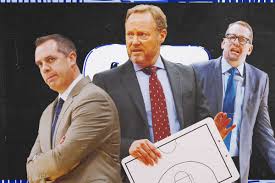What makes an NBA Coach of the Year?
The winner is almost always the bench boss of one of the very best teams in the league. Last year, Mike Budenholzer won the award as the leader of the 60-win Bucks. Dwane Casey earned it the year prior, leading the team with the second-best record in the NBA. Mike D’Antoni claimed the award in 2016-17 as the Rockets finished with the league’s third best record — the two teams ahead of him were coached by then reigning Coach of the Year Steve Kerr and three-time winner Gregg Popovich. Voters seemed to value one-time previous winner D’Antoni’s turnaround of Houston more than they wanted to reward Kerr after his team lost the Finals and signed Kevin Durant, and more than they wanted to keep giving Popovich more trophies.
Only two coaches in the past 20 years have won Coach of the Year with less than 50 wins: Doc Rivers in Orlando in 1999-2000 and Sam Mitchell with the Raptors in 2006-07.
Rivers’ Magic went 41-41, a worse record than the year prior for Orlando but with a roster that extremely low expectations. Lots of Darrell Armstrong and Bo Outlaw. This win stands out a lot as the only Coach of the Year win in decades (perhaps ever) where the coach’s team didn’t make the playoffs.
Mitchell’s Raptors went 47-35, picking up 20 additional wins from the year prior and making the playoffs for the first time in years. Mitchell had been the coach the year prior, but got a lot of credit for the turnaround. (This is not dissimilar from D’Antoni’s 2017 win, though D’Antoni’s team was elite and Mitchell’s Raptors were not.)
Looking at the recent history of the award and the candidates on the table, it’s pretty easy to narrow this down to who really has a shot at building a winning narrative over the last seven weeks of the season.
Budenholzer coaches the best team again, but there’s an unwritten rule that coaches don’t win the award in back-to-back seasons. It’s never happened. It probably stands to reason that if voters haven’t broken this rule for Popovich, Phil Jackson or (in recent years) Kerr, they won’t break it for Budenholzer, who hasn’t won a title. (D’Antoni losing out to Casey in 2018 with a 67-win team — a 12-win increase — is a good recent indicator here.)
Coaches tend to get dinged when their teams seem overloaded with talent. Kerr hasn’t won since 2016. Erik Spoelstra never won during the Heatles’ reign. (He is absolutely the best active coach without a COY trophy.) Phil Jackson won his last award in 1995-96, the 72-win season — he didn’t get the nod in any season with the Lakers, despite winning five championships in Los Angeles.
This would tend to rule out Rivers given how loaded everyone agreed the Clippers were entering the season as the title favorite. It might hurt Frank Vogel as well, though there are other compelling points in Vogel’s favor.
The rarity of a coach of a middling team getting the nod — only Mitchell and Rivers in 20 years — would seem to knock out Taylor Jenkins in Memphis. (Rookie head coaches are usually off the table, as well.) The overwhelming history of coaches of 50-win teams getting the nod would rule out Rick Carlisle (whose case is damaged by Luka Doncic’s supreme excellence), Nate McMillan (whose case has suffered as Indiana has gotten uneven over the last month) and probably Billy Donovan (who shares credit for the Thunder’s surprising rise with Chris Paul, a proverbial coach on the floor).
Brett Brown has no case, and Spoelstra’s has weakened since Miami fell out of the upper tier of East teams. We’ve indicated that Rivers is out, and I’m skeptical voters will consider D’Antoni again (despite him being a media favorite, and the media voting for the award) unless Houston goes on an absolute tear under their new tiny-ball paradigm. We’re discussing Budenholzer’s long odds as the reigning COY.
So who’s left? Nick Nurse, Mike Malone, Brad Stevens and Vogel.
Vogel is a coach’s coach and has a really nice narrative, being cast off from a bad franchise and somehow getting hired to coach LeBron James and Anthony Davis, and then connecting with them and winning. Malone is a coach’s coach and clearly isn’t a fluke — this is a real string of success for him in Denver after getting unfairly pushed out in Sacramento. His narrative isn’t as rich as Vogel’s, but it’s still a warm story. Stevens has been a media darling in the past and doesn’t already have a COY win. Boston’s post-Kyrie Irving recovery provides a good narrative.
But I think the favorite at this point should be Nurse.
He led the Raptors to the championship last season as a rookie NBA head coach. He’s a media darling. (As in, he’s not a jerk to the media and actually engages on strategy topics.) No one expected the Raptors to be this good after losing Kawhi Leonard. How the team navigated a spate of major injuries to major players was revealing in a good way. The development of raw players into stars, the inclusion of unheralded rookies out of necessity and want, the incredible team culture — Nurse gets some credit for all of it. And he seems like a regular human, albeit one with his own logo apparel that he wears.
Barring some major changes in standings down the stretch, or a breaking of the precedent against back-to-back winners, Nurse is the Coach of the Year. Grab your axe and play us something, Coach.


